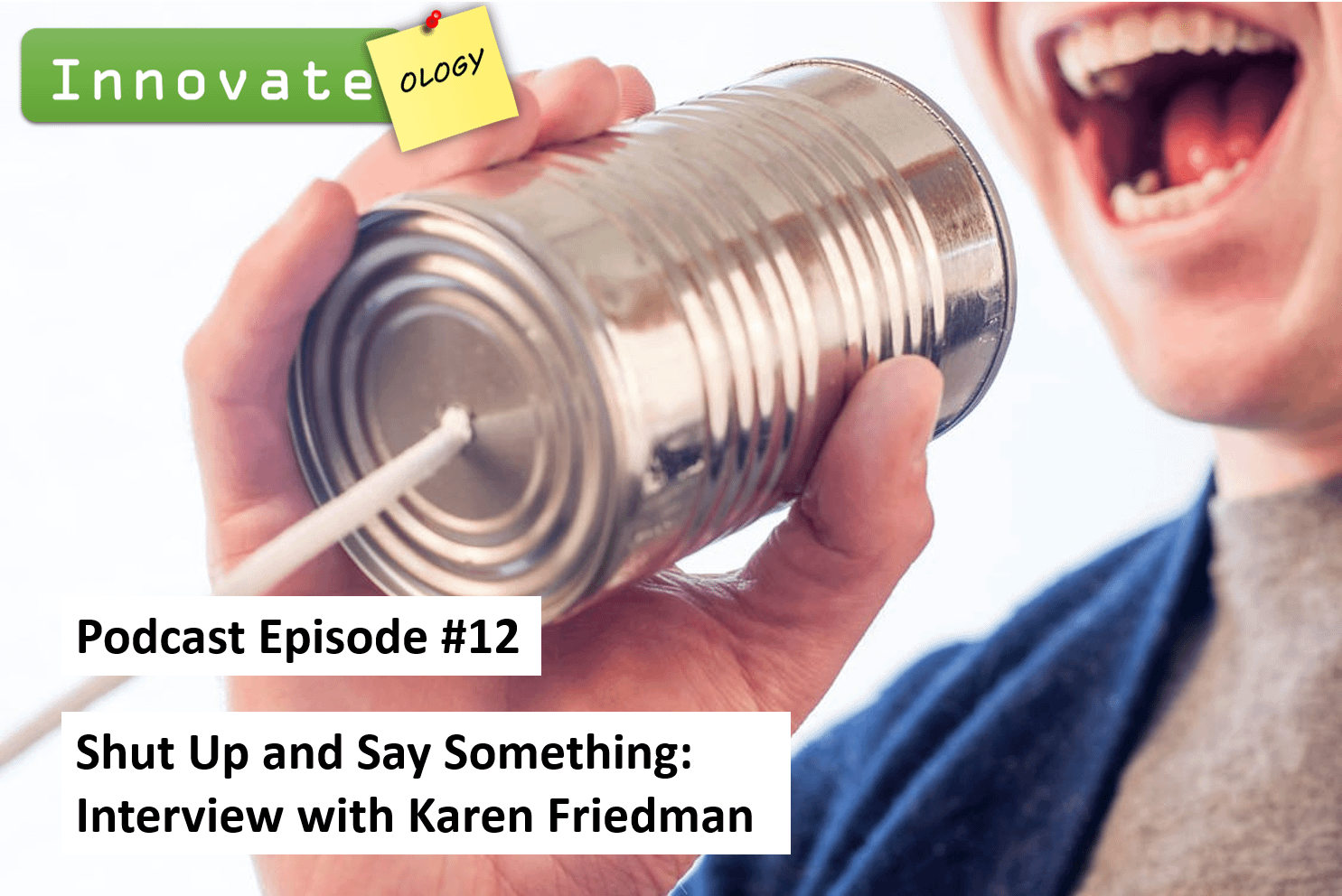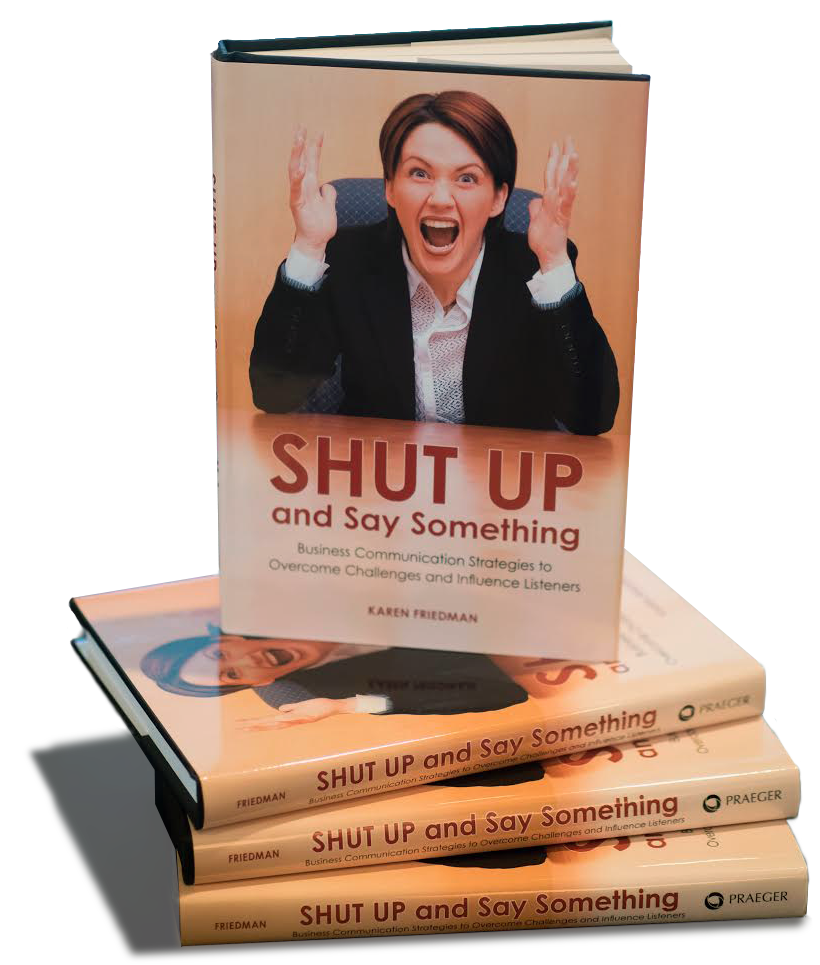Episode 12 – Shut Up And Say Something: Interview With Karen Friedman

About the Expert: Karen Friedman
Karen Friedman is an international communications expert who has worked with professionals on four continents. She is the author of the best-selling book, “Shut Up and Say Something,” and the recently released book, “Ordinary People: Extraordinary Lessons” which is available on Amazon.
Karen’s expertise has been recognized across industries and by prominent public figures such as former First Lady and Secretary of State, Hillary Rodham Clinton. Karen spent more than two decades as an award-winning major market television news reporter. Today, she continues to write as a columnist for the Philadelphia Business Journal and her articles are syndicated nationwide.
Karen is adjunct faculty at Smith College’s prestigious executive education programs for women where she teaches leadership education. In addition Karen hosts the popular Internet TV and radio series on ReachMD which helps healthcare professionals to improve their communications skills.
What is the Best Way to Communicate?
It is useful to keep in mind that effective communication is a lifelong practice. Often we approach communicating with our own agenda and we talk and talk and talk. We too often fail to put ourselves in the seats of our listeners. To be effective, it is best to take what we want to say and frame it from the perspective of the audience. In this way you are focused on helping your audience to solve their problems. When your audience’s interests and needs are at the forefront, you become a more connective communicator.
We also need to stay hip or current, so that may mean tapping people younger than you to get help with Instagram, Twitter, etc. Similarly, we need to value the sage, those who have vast experience and depth of knowledge have a lot to offer us. So, we should value those we encounter and work with and understand what we can learn from them.
Why Do We See Mishaps with Email?
Email is a curse and a blessing at the same time. Yes, it saves time but many of us don’t know how to really write emails. Often emails are too long. We bury the lead. We take too long to make our points. What’s more email can create huge misunderstandings due to its limitations. Intended humor is frequently mistaken and misinterpreted. To assure your emails are optimally effective, take these steps. Assure the subject line is relevant to the message. Use a lot of white space. Keep your main points on the first page. If it’s really important, pick up the phone or see the person face-to-face.
How Do We Get an Audience to Tune In and Not Tune Out?
Even when you have given a talk or presentation a hundred times, you should approach each audience mindful that it is the first time that they are hearing it. Always treat what you say as if it is the first time you are uttering it. As the communicator, it is your responsibility to communicate with compassion, enthusiasm, and simplicity. Your audience should feel that you genuinely care about them and their problems.
How Do We Define Executive Presence?
Executive presence is often overused and misused and spoken about as if it’s new but it really isn’t. If you want to have presence, start by being present. So often it is thought of as just eye contact, body language, movement, command, stance. It is all that, but it’s a mixture of more.
There was a recent study that said most people don’t like giving presentations because they fear that they are not captivating their listeners. There is good reason to worry about captivating an audience. Here’s the stats. Most listeners admit that they are doing something else: 28% say they are texting, 27% say they are checking their email, 19% say they are surfing the net and 17% say they are so bored and disinterested they are sleeping.
If you are presenting and you are focused on saying every word correctly and the order of your slides and the way you’re dressed, you’re not thinking about your audience. You are not present for your audience. When we create communications, we need to be focused outward. So when you are standing in front of a room and your focus is to get applause and your focus is on every word and getting every line and every slide nailed, then you are not present. When you are fully focused on the listener and addressing the interests, concerns and needs of the listener, then you have executive presence.
Characteristics that Define Executive Presence
Gravitas: your command, authenticity, how you handle situations
Way You Communicate: all those points made in the podcast
Physical Being: making eye contact, enthusiasm, empathy, alignment
Executive presence is leadership presence; it is why people would or would not want to follow you.
Why Is Communicating So Critical to Your Success?
Communicating is critical to your success because it is how your ideas are shared and your opinions are expressed. Effective communication is even how you show up at work. Let’s say you are at a business meeting and Johnny and Suzy speak up and perhaps they even talk about thoughts and ideas you have had, but you didn’t speak up. As a result, Johnny and Suzy get noticed, get recognized, and get promoted. You might be a lot smarter than them, but you didn’t speak up and that means you didn’t show up.
We should always think about the outcomes we want and the results we seek. Next we should prepare and organize our thoughts. Importantly, we must speak up and communicate effectively. To continuously improve communications skills, it helps to keep in mind that everyday encounters can teach us valuable lessons when we learn to look for them.
Always look for ways to move the meter. Think of communicating as the “make me care meter.” If people care about what you are saying, they’ll listen. If they listen, you will find that the outcomes and results come a little more easily for you. So, remember to use your “Make Me Care” meter daily.
![]()
Where can you find Karen Friedman?
Website: http://karenfriedman.com/
Link to her books: http://karenfriedman.com/books/#.WcV7OciGOM8
Ordinary People: Extraordinary Lessons
Leadership Lessons from Everyday Encounters
by Karen Friedman
Based on author Karen Friedman’s long-running column in the Philadelphia Business Journal, Perspective on People, Ordinary People: Extraordinary Lessons is a compilation of anecdotal lessons from

everyday life. From hilarious to heartfelt, entertaining to enlightening, each story portrays a unique challenge and reveals a new perspective on how to overcome obstacles and create more meaningful interactions with others.
Shut Up and Say Something
by Karen Friedman
Learn how to convincingly communicate their expertise in any business situation: this book demonstrates how to condense complicated concepts, minimize communication mistakes, avoid misinterpretation, convey vision, and quickly influence decision makers. Strategies for expressing yourself succinctly and clearly, dodging “loaded” questions, thinking fast on your feet, humanizing inscrutable information, and using humor to engage an audience are examples of the topics covered. The importance of prioritizing outcomes is emphasized throughout the book.
Tell us what you think and leave a comment! When have you wished you spoke up during a meeting? What is one tactic you are going to use to speak up at your next meeting?
Join our adventure and join our email list.

2 Responses
This was great. I’ve read her book and her column in PBJ and have always enjoyed them. It was great to hear her voice. It so ‘matches’ what she writes about, but was so great to hear the ‘spice’ in the way she says it.
So glad you liked the interview with Karen Friedman! Linda Lo did a great job leading interview and my favorite part was around the importance of making eye contact in the hallway at our work place and that being a leader means being present.
Comments are closed.